Empowering Central Texas Communities: CommUnityCare Health Centers Helps Families Prepare for a Healthy School Year
The CommUnityCare Back to School Events, held in celebration of National Health Center Week, were an overwhelming success this year.
These annual events have become a cornerstone of our commitment to supporting Central Texas families as they prepare for the upcoming school year. By offering free backpacks, essential school supplies, vaccines, and valuable community resources, CommUnityCare Health Centers aims to ease the financial burden on families and ensure that students are well-prepared and healthy as they return to the classroom.
As the new school year begins in our communities, we’re thrilled to announce the impact we made during these events. Over two weekends, an impressive 1,186 backpacks filled with school supplies were distributed to students, providing them with the tools they need to succeed. In addition, 912 vaccines were administered ensuring that students are protected against preventable diseases and ready to start the school year in good health.
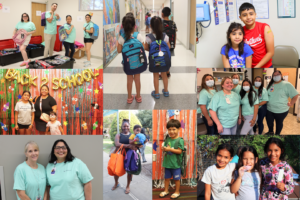 For the first time, CommUnityCare Health Centers was proud to offer Back to School Events at three of its health centers.
For the first time, CommUnityCare Health Centers was proud to offer Back to School Events at three of its health centers.
North Central Health Center
- Vaccines Administered: 431
- Backpacks Distributed: 460
Pflugerville Health Center
- Vaccines Administered: 180
- Backpacks Distributed: 190
Southeast Health and Wellness Center
- Vaccines Administered: 301
- Backpacks Distributed: 536
National Health Center Week is a time to recognize and celebrate the vital role that community health centers like CommUnityCare play in providing accessible, high-quality healthcare to underserved populations.
“This week highlights the importance of health centers in promoting wellness, reducing health disparities, and addressing the social determinants of health that can impact the overall well-being of individuals and families,” said Karla Rivera, Community Development Manager. “Our Back to School Events are a key part of this mission, as they allow us to engage directly with the community and offer support where it is needed most. By addressing these broader issues, we strive to create a more equitable and supportive environment for all students.”
These events were a true community effort, and they would not have been possible without the dedication and hard work of our incredible employees, partners and volunteers. Their unwavering commitment to our community played a vital role in making these events a success. From organizing logistics to handing out supplies and administering vaccines, every contribution made a difference.
We extend our heartfelt thanks to everyone who contributed their time, energy, and resources to ensure that our Back to School Events made a positive impact on so many families. Together, we’re helping to build a healthier, stronger community, one family at a time. As we look ahead to the future, we remain committed to supporting our community and ensuring that every student has the opportunity to thrive.
 As of July 25, 2024, all text messages from CommUnityCare Health Centers will be sent through Epic Hello World using the SMS short code, 65934. Patients who have opted to receive text messages will continue to receive all future communication from the new number.
As of July 25, 2024, all text messages from CommUnityCare Health Centers will be sent through Epic Hello World using the SMS short code, 65934. Patients who have opted to receive text messages will continue to receive all future communication from the new number.  Central Health System Overview:
Central Health System Overview:  We are seeking individuals from priority populations with an emphasis on multi-marginalized people, such as those who are unsheltered or unhoused, and persons of color:
We are seeking individuals from priority populations with an emphasis on multi-marginalized people, such as those who are unsheltered or unhoused, and persons of color: 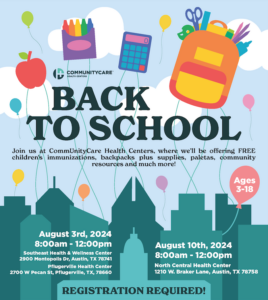 In honor of National Health Center Week, CommUnityCare Health Centers is excited to host three back-to-school events to prepare Central Texas children for the upcoming school year.
In honor of National Health Center Week, CommUnityCare Health Centers is excited to host three back-to-school events to prepare Central Texas children for the upcoming school year.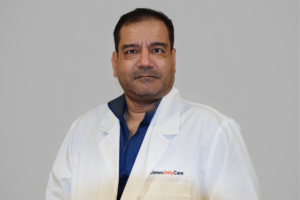
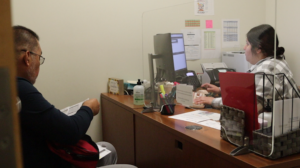 “Patients received a letter in the mail letting them know if they had to go through that recertification process for Medicaid. The problem with that is because we had continuous Medicaid for three-plus years, some folks moved and didn’t get the envelope, others didn’t hear about it, or they didn’t understand why they received the envelope,” said CommUnityCare Chief Operating Officer, Nancy Ban. “So, we had many patients who did not know how to get back on Medicaid.”
“Patients received a letter in the mail letting them know if they had to go through that recertification process for Medicaid. The problem with that is because we had continuous Medicaid for three-plus years, some folks moved and didn’t get the envelope, others didn’t hear about it, or they didn’t understand why they received the envelope,” said CommUnityCare Chief Operating Officer, Nancy Ban. “So, we had many patients who did not know how to get back on Medicaid.”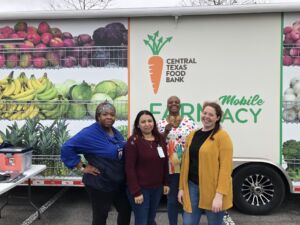 CommUnityCare Health Centers is proud to partner with the Central Texas Food Bank Mobile FARMacy program. The FARMacy program makes it possible for healthcare providers at CommUnityCare Health Centers to ‘prescribe’ nutritious food. Patients are able to access a mobile FARMacy pantry while accessing medical care at a CommUnityCare Health Center location and easily shop for nutritious food that meets USDA MyPlate standards.
CommUnityCare Health Centers is proud to partner with the Central Texas Food Bank Mobile FARMacy program. The FARMacy program makes it possible for healthcare providers at CommUnityCare Health Centers to ‘prescribe’ nutritious food. Patients are able to access a mobile FARMacy pantry while accessing medical care at a CommUnityCare Health Center location and easily shop for nutritious food that meets USDA MyPlate standards. 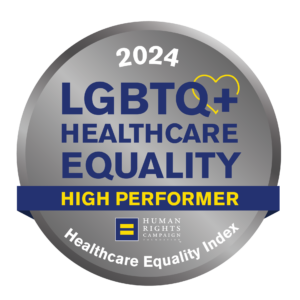 Campaign Foundation,” said Jaeson Fournier, President and CEO of CommUnityCare Health Centers. “At CommUnityCare, we are dedicated to providing inclusive healthcare services to all members of the LGBTQ+ community. This recognition reaffirms our commitment to creating a welcoming and supportive environment for LGBTQ+ patients and their loved ones. As we celebrate this achievement, we remain steadfast in our mission to eliminate disparities and ensure equitable access to healthcare for the communities we serve.”
Campaign Foundation,” said Jaeson Fournier, President and CEO of CommUnityCare Health Centers. “At CommUnityCare, we are dedicated to providing inclusive healthcare services to all members of the LGBTQ+ community. This recognition reaffirms our commitment to creating a welcoming and supportive environment for LGBTQ+ patients and their loved ones. As we celebrate this achievement, we remain steadfast in our mission to eliminate disparities and ensure equitable access to healthcare for the communities we serve.”